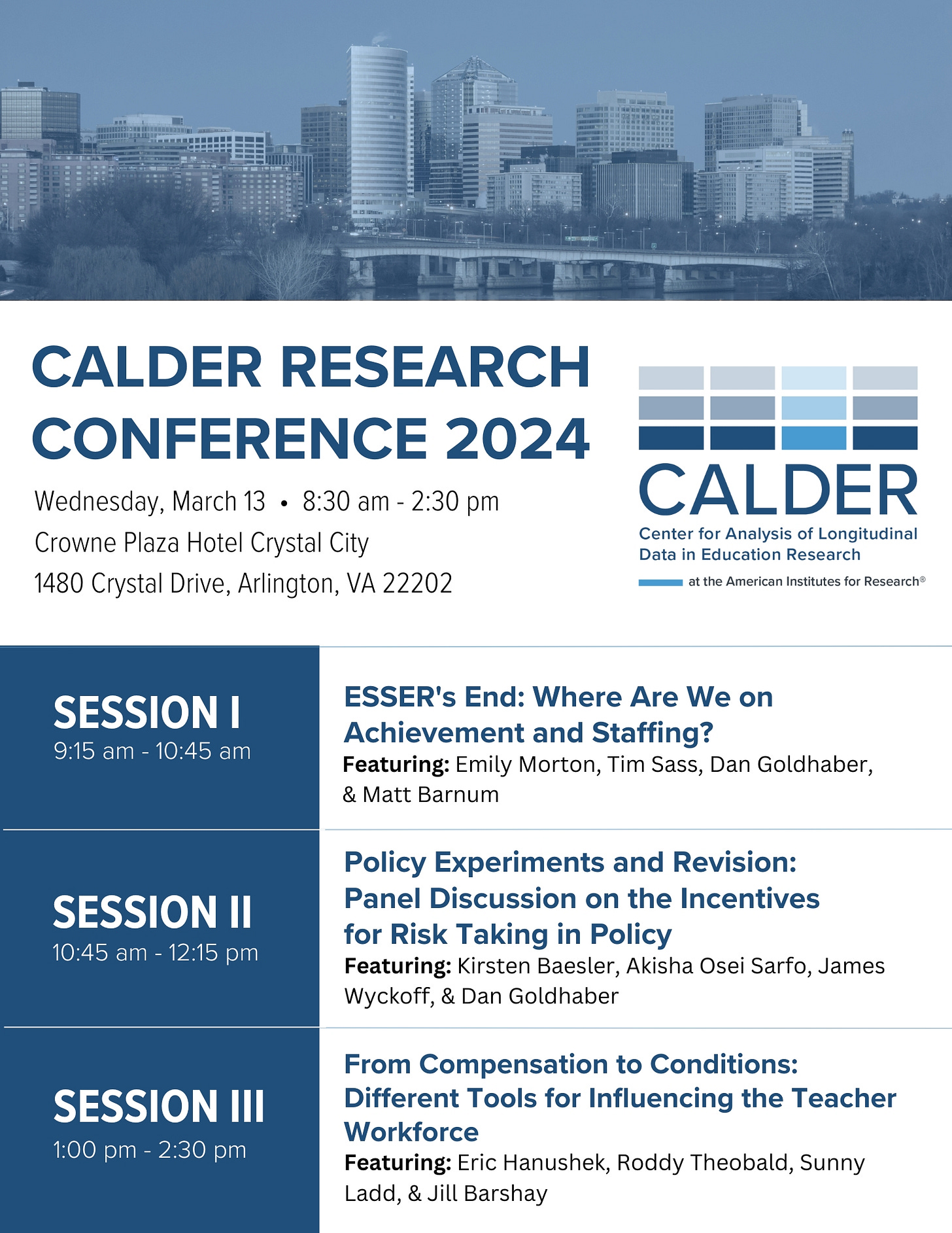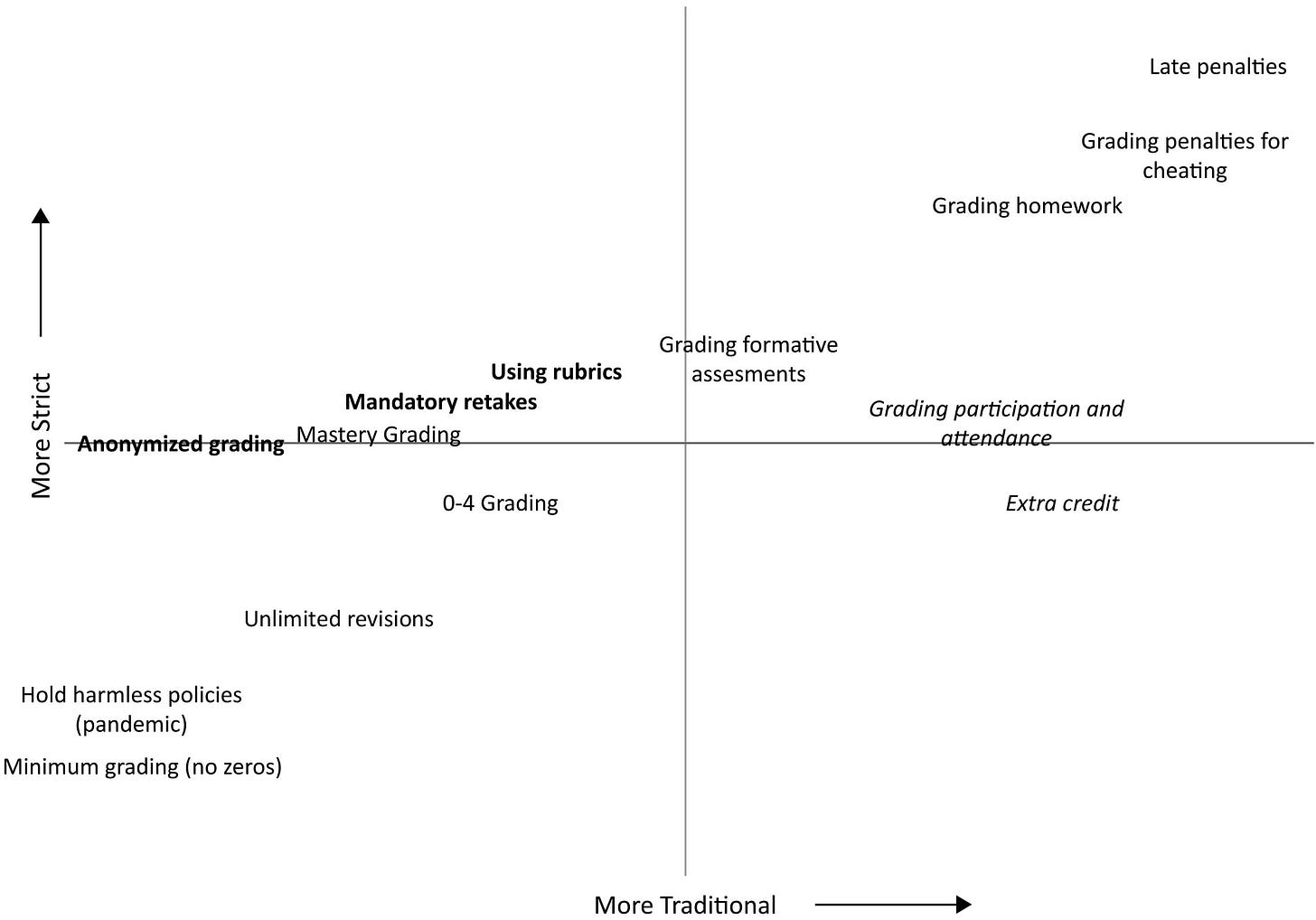Welcome back to the Education Policy Hotlist!
This edition features stories and articles covering student achievement, education finance, teacher retention, assessment, and measuring equitable outcomes in our investments. We also share tools and guides to help you use data and evidence to inform your policy decisions and actions. We hope you share your feedback and suggestions with us. Thank you for reading and subscribing.
Don’t forget to follow us on Instagram, Facebook, Linkedin, and Twitter!
Mark Your Calendar
Don’t miss the CALDER Research Conference on Wednesday, March 13, 2024, in Arlington, VA. This is a one-day meeting featuring research from some of our CALDER experts and discussion between researchers, policymakers, and practitioners. Register here.
Equity in Education Policy
One black woman’s journey in education and finding a home for her whole self
Dr. Mikkaka Overstreet shares her personal and professional experiences as a Black woman working in education. She reflects on the challenges and opportunities she faced in different roles and contexts and how she found a place to make an impact without leaving parts of herself at the door. Her new piece discusses the importance of diversity, equity, and inclusion in education research and practice. Dr. Overstreet calls on all education and education-adjacent systems to prioritize representation and support for Black women and other marginalized groups.
A database of resources and programs for Native students in Washington
The website PNW Finder for Indigenous Resources in Education is a database of resources and programs that support Native students with their academic, cultural, and social-emotional well-being in Washington state. The website allows users to search for resources and programs offered by Tribes, schools, and community organizations and submit new resources and programs. The website also provides information about the project’s partners and contributors and the logo and artwork designed by a Native artist. This is one example states can invest in for Native students, families, and educators to access and share resources and programs that meet their needs and interests.
Another hot resource: Oregon Department of Education and the R16 Comprehensive Center developed a Tribal Consultation Toolkit to support school collaboration with Tribes while planning for federal spending.
Oklahoma’s nonbinary teen’s death sparks controversy
A 16-year-old nonbinary student at Owasso High School in Oklahoma died following a school fight. The incident has sparked controversy, with critics arguing that the state’s 2022 bathroom bill, which forced the student into a potentially unsafe space, contributed to the tragedy. This incident underscores the need for policies that ensure the safety and inclusivity of all students, particularly those identifying as LGBTQ+.
Academic Outcomes
On-track indicators from DQC: A data-based tool for action
Recent data shows that more K -12 students are not performing at grade level. As schools across the U.S. look to support these students’ learning, some districts are turning to “on-track indicators” to identify the students needing support early and keep them on track. This highlights the importance of robust, timely state data as a tool for local leaders to employ early interventions.
The economic cost of lost learning due to the pandemic
The 74 reported on a new analysis by Stanford University economist Eric Hanushek, who estimates the long-term impact of the pandemic on students’ math skills and future earnings. The analysis uses data from two standardized tests, PISA and NAEP, to compare the performance of U.S. students with their international peers. The article argues that the U.S. needs to invest in evidence-based interventions to address the learning loss and close the achievement gaps. We must start quantifying the economic consequences of the pandemic and creating local calls for urgent action to improve the quality and equity of education.
Growing student achievement gaps across states
A new visualization tool reveals that achievement gaps are widening across subjects and states. The report suggests that the easing of the No Child Left Behind Act in 2012 set off a decline in achievement scores that is still being felt. This trend highlights the importance of accountability in education policy and the potential need for a renewed focus on equitable outcomes.
Education Finance
A guide for evidence-based spending in education
Results for America released the Education Evidence-Based Spending Guide that helps education leaders and policymakers use evidence and data to allocate funds for effective and equitable solutions. The new tool provides strategies, leading examples, and resources on defining desired outcomes, identifying evidence-based interventions, designing and implementing contracts and grants, and monitoring and evaluating results. Check out their insights about evidence-based spending in education that offers practical guidance and best practices on shifting dollars to what works and improving student outcomes.
Cleveland schools face budget cuts post-COVID
The Cleveland school district, one of the largest recipients of federal COVID relief cash, may soon have to cut programs like summer school, after-school, and a laptop program due to the end of aid. The district is considering various measures to cover the loss of additional COVID aid, including ending a decade-long experiment of year-round classes in some schools. This situation underscores the challenges schools face in maintaining pandemic-era initiatives as federal aid dries up, highlighting the need for sustainable funding strategies in education policy.
Tennessee’s new school funding formula: A case study of implementation
A new Bellwether report, After the Policy Win: First-Year Implementation of Tennessee’s New School Funding Formula, documents the progress and challenges of putting the Tennessee Investment in Student Achievement Act (TISA) into practice. TISA passed in 2022, was designed to simplify and improve the equity of the state’s education funding system. The report points to five implementation phases that should guide states as they move from policy to practice and offers lessons for other states interested in K-12 funding reforms.
Student Engagement
How out-of-school time programs measure their impact and equity
A new report by Child Trends, Measuring Youth Development: How Out-of-School Time Programs Collect and Use Data, explores how after-school, summer, and other out-of-school time (OST) programs assess their work and outcomes. Measuring OST programs can be complicated because of the disjointed programming from the typical school day or year and fragmented data collection. With this in mind, the article also examines these challenges and opportunities in measuring and improving their equity and quality. The article is based on interviews and surveys with staff from OST programs that experts in the field recommended.
School nurses as a potential solution to chronic absenteeism
The74 reported a new study from University of Missouri researcher Knoo Lee that found that school nurses can play a crucial role in identifying and addressing the causes of partial-day absences, often leading to full-day absences and chronic absenteeism. The study is based on interviews with 21 school nurses in six online focus groups. The article also features the perspectives of school nurses and experts on the challenges and opportunities of involving school nurses in attendance interventions. This new research suggests that school nurses are a valuable but underutilized resource for improving student attendance and achievement.
Measurement and Assessment
Ethical thinking as a 21st century skill and its implications for education
NCIEA published a new piece, Ethical Thinking as a 21st Century Skill, proposing a new definition of ethical thinking as a 21st-century skill, drawing on various frameworks and literature sources emphasizing ethics, responsibility, and related competencies. The article also discusses the development, instruction, and assessment of ethical thinking and the challenges and opportunities associated with each aspect. There are important implications and recommendations for educators and policymakers who want to foster ethical thinking among students. Take a look to review this new conceptual and practical framework for integrating ethical thinking into curriculum, instruction, and assessment.
The pitfalls of “equitable” grading policies
A new article from Fordham Institute, Think Again: Does “equitable” grading benefit students? challenges four common claims that support lenient grading practices, such as minimum grading, no penalties for late work, and no grading of homework. The article argues that these policies risk lowering academic standards, reducing student learning, and confusing stakeholders. The authors propose implications and recommendations for policymakers and educators who want to maintain high expectations and avoid grade inflation. It is time to question our assumptions and behind some of the recent trends in grading reforms — including efforts to reduce homework and set minimum grades for all students.
Teacher Workforce
A model policy for advanced teaching incentives
A new model policy template, Advanced Teaching Incentive Program Model Policy, from ExcelinEd proposes a framework for creating advanced licensure designations for experienced teachers who demonstrate subject-area competence and positively impact student outcomes. ExcelinEd outlines the purpose, definitions, roles, designations, and funding mechanisms of the policy, as well as some examples of existing programs in other states. The article also provides some resources and references for further information. There is a pathway forward to reward and retain effective teachers, especially in high-needs districts and fields.
A task force to address teacher retention in North Dakota
North Dakota reports about a new task force to get teachers past the 5-year mark. The task force consists of 15 members from various educational backgrounds. It aims to provide a report with recommendations for legislation by Sept. 30. The task force will address and discuss mentorship, student teaching, and academic calendars to manage the chronic teacher shortage problem.
Literacy
Public input Requested on federal literacy policy: A new report by Senator Bill Cassidy
Bill Cassidy, the Ranking Member of the Senate Health, Education, Labor, and Pensions (HELP) Committee from Louisiana (R-LA), has published a new report concerning child literacy. The report primarily concentrates on K-12 literacy rates and invites the public to share their ideas on enhancing federal literacy policies. Suggestions from the public are welcome until April 5, 2024, and should be emailed to Literacy@help.senate.gov.
Can’t Miss Professional Learning
Check out Shoreline Consulting classes open for registration
My friends at Shoreline Consulting are hosting transformative courses designed to challenge, educate, and inspire. Here’s a snapshot of what they are offering:
HR As Policy Violence (Every Thursday, 4-6 PM PT, May 2 - Dec 19, excluding July): This course helps you navigate the constraints within the Human Resources sector, centering humanity and applying core values even when it seems impossible.
Equity as Praxis (Bi-Weekly on Wednesdays, 12-2 PM PT, April 10 - Oct 9, 2024): A practice space focusing on marrying action, reflection, and practice. It provides gentle yet firm provocation to catalyze tangible action towards just systems.
How are you Doing With your Whiteness: An Antiracism Course for White Educators: A 12-session discussion and action-based course for white educators seeking support and accountability in embodying antiracism in their daily personal practices and institutions.
Please share these opportunities widely and register here!
Dr. Christine Pitts is an executive leader advancing evidence-based public policy for social impact. Follow her on LinkedIn and Instagram for more updates.












